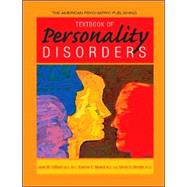
John M. Oldham, M.D., M.S., is Professor and Chairman of the Department of Psychiatry and Behavioral Sciences at the Medical University of South Carolina in Charleston, South Carolina.
Andrew E. Skodol, M.D., is Professor of Clinical Psychiatry at the Columbia University College of Physicians and Surgeons and Director of the Department of Personality Studies at New York State Psychiatric Institute in New York, New York.
Donna S. Bender, Ph.D., is Assistant Clinical Professor of Medical Psychology in Psychiatry at Columbia University College of Physicians and Surgeons and Research Scientist in the Department of Personality Studies at the New York State Psychiatric Institute in New York, New York.
| Contributors | xiii | ||||
| Introduction | xvii | ||||
|
|||||
|
3 | (14) | |||
|
|||||
|
17 | (18) | |||
|
|||||
|
|||||
|
35 | (22) | |||
|
|||||
|
|||||
|
|||||
|
57 | (32) | |||
|
|||||
|
89 | (14) | |||
|
|||||
|
|||||
|
103 | (16) | |||
|
|||||
|
|||||
|
|||||
|
119 | (10) | |||
|
|||||
|
129 | (14) | |||
|
|||||
|
143 | (12) | |||
|
|||||
|
155 | (16) | |||
|
|||||
|
|||||
|
171 | (16) | |||
|
|||||
|
|||||
|
187 | (22) | |||
|
|||||
|
|||||
|
209 | (14) | |||
|
|||||
|
|||||
|
|||||
|
223 | (16) | |||
|
|||||
|
|||||
|
|||||
|
239 | (18) | |||
|
|||||
|
|||||
|
|||||
|
|||||
|
257 | (18) | |||
|
|||||
|
275 | (14) | |||
|
|||||
|
|||||
|
|||||
|
289 | (18) | |||
|
|||||
|
|||||
|
307 | (14) | |||
|
|||||
|
|||||
|
321 | (14) | |||
|
|||||
|
335 | (12) | |||
|
|||||
|
347 | (12) | |||
|
|||||
|
|||||
|
359 | (16) | |||
|
|||||
|
375 | (12) | |||
|
|||||
|
|||||
|
387 | (18) | |||
|
|||||
|
405 | (16) | |||
|
|||||
|
421 | (10) | |||
|
|||||
|
431 | (18) | |||
|
|||||
|
|||||
|
|||||
|
449 | (14) | |||
|
|||||
|
|||||
|
463 | (14) | |||
|
|||||
|
|||||
|
|||||
|
477 | (16) | |||
|
|||||
|
493 | (30) | |||
|
|||||
|
|||||
|
523 | (18) | |||
|
|||||
|
|||||
|
541 | (20) | |||
|
|||||
|
|||||
|
|||||
|
561 | (18) | |||
|
|||||
|
579 | (28) | |||
|
|||||
|
607 | (16) | |||
|
|||||
|
|||||
|
623 | (18) | |||
|
|||||
|
|||||
|
|||||
|
641 | (12) | |||
|
|||||
|
|||||
|
653 | (16) | |||
|
|||||
|
669 | (14) | |||
|
|||||
|
|||||
|
|||||
| Appendix: DSM-IV-TR Diagnostic Criteria for Personality Disorders | 683 | (8) | |||
| Index | 691 |
The New copy of this book will include any supplemental materials advertised. Please check the title of the book to determine if it should include any access cards, study guides, lab manuals, CDs, etc.
The Used, Rental and eBook copies of this book are not guaranteed to include any supplemental materials. Typically, only the book itself is included. This is true even if the title states it includes any access cards, study guides, lab manuals, CDs, etc.